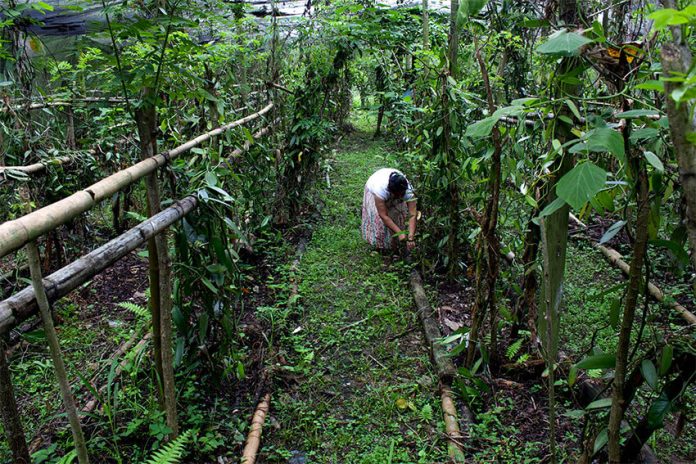Residents of Chililix, Puebla, high in the Sierra Norte of the state, are hoping to join their neighbors in achieving denomination of origin status for the vanilla they grow and harvest there. In this small town in Puebla’s Hueytlalpan municipality, many residents still speak their indigenous language, Totonaco, and most making a living from farming the coffee and other crops that grow in their high mountain terrain.
Until a few years ago, the vanilla that grew here was just another one of the verdant green trees that grew besides the waterfalls and the orange trees. But a program administered by the Ministry of Rural Development (SADER) has many residents now believing vanilla might be their future so they are petitioning to be added to the list of 39 other municipalities in Puebla and Veracruz where this vanilla is endemic.
Like Champagne in Champagne, France, or Tequila in Tequila, Jalisco, a denomination of origin will not only provide an international spotlight on these small producers but, they believe, will mean more assistance from local authorities.
Farmers must both protect their crop from theft (which generally happens in December when the fruit is rip to pick), and other threats — rot due to excessive rain, the fungus stem rust, bella moths, and firebugs — all which threaten the health of the vanilla trees and the viability of the yearly harvest.
Salvador Gómez, a SADER technician working with residents toward their certification, says the denomination of origin will also mean that local authorities are pressured to keep the land where the vanilla is grown safe and healthy, both physically and biologically, that it will help to preserve traditional farming techniques, and certify originality for international buyers.
He also believes the designation will mean that producers in Hueytlalpan will be able to make more formalized sales to larger buyers, instead of simply bartering or selling in the local market.
Gómez, along with a technical team from SADER, is working with locals to ensure their vanilla crop is healthy and prosperous. They are teaching them how to properly pollinate their plants, how to make and use organic compost, how to separate coffee plants and vanilla plants to avoid insect infestations and how to use pesticides to control any infestations that appear.
Local producers attending these workshops hope to produce between 30 and 40 kilos of vanilla a year that they can sell in powder or liquid form. Many families were formerly coffee producers but have switched to vanilla production either as a substitute or in addition to that crop.
María Pérez has been producing vanilla for four years and says she appreciates that it can be grown in a much more reduced space than other crops. Another grower, María Jiménez, hopes that by cultivating vanilla she can make enough money to send her children to college. Cecilia Galicia and her husband Martín Fernández once farmed only coffee, but last year they produced 23 kilos of vanilla to sell.
The high price of vanilla in the market and the fluctuation of coffee in the past few years have likely influenced many of these small farmers to convert to vanilla production. They are counting on denomination of origin status to be the push they need to succeed in their new venture.
With reports from El Sol de Puebla
